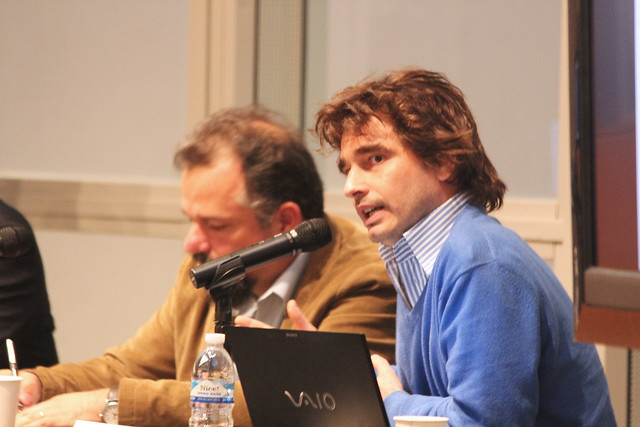Mexico-Brazil: Literature and Culture
November 12, 2014 - 4:00 pm
Skylight Room (The Graduate Center, CUNY)
THE BILDNER CENTER PRESENTS THE FIRST OF THE MEXICO-BRAZIL SERIES
Paulo Moreira, Yale University
Javier Uriarte, State University of New York, Stony Brook
Moderator: Araceli Tinajero, The City College and Graduate Center, CUNY
Paulo Moreira will discuss his book Literary and Cultural Relations Between Brazil and Mexico (Palgrave, 2013) where he proposes an innovative assessment of cultural relations in Latin America. He focuses on a series of imaginative encounters involving extraordinary writers, artists, filmmakers, and thinkers from Brazil and Mexico to represent the potential of intercultural contacts within Latin America. Some of these are Ronald de Carvalho, Alfonso Reyes, João Guimarães Rosa and others.
On a similar continental literary comparison, yet a different time period, Javier Uriarte will talk about his studies on the intersection of travel, state formation, and war in late 19th century Latin America compiled in his book manuscript, tentatively titled Fazedores de desertos: viajes, guerra y Estado en América Latina (1864-1902), won Uruguay’s 2012 National Prize for Literature in the Unpublished Literary Essay category.
 Paulo Moreira is Associate Professor of Portuguese at Yale University. He is the author of Modernismo Localista, a book on the short stories of William Faulkner, Guimarães Rosa, and Juan Rulfo, and he has published articles on American, Brazilian, and Mexican twentieth-century literatures.
Paulo Moreira is Associate Professor of Portuguese at Yale University. He is the author of Modernismo Localista, a book on the short stories of William Faulkner, Guimarães Rosa, and Juan Rulfo, and he has published articles on American, Brazilian, and Mexican twentieth-century literatures.
 Javier Uriarte is Assistant Professor of Hispanic Languages & Literature at Stony Brook University. He has co-edited one special issue of Cahiers de Li.Ri.Co. dedicated to Uruguayan literature and titled Raros uruguayos: nuevas miradas (Paris: Université Paris 8, 2010), and is the co-editor of the collective volume Entre el humo y la niebla: guerra y cultura en América Latina (forthcoming in 2014 with the Instituto Internacional de Literatura Iberoamericana – IILI).
Javier Uriarte is Assistant Professor of Hispanic Languages & Literature at Stony Brook University. He has co-edited one special issue of Cahiers de Li.Ri.Co. dedicated to Uruguayan literature and titled Raros uruguayos: nuevas miradas (Paris: Université Paris 8, 2010), and is the co-editor of the collective volume Entre el humo y la niebla: guerra y cultura en América Latina (forthcoming in 2014 with the Instituto Internacional de Literatura Iberoamericana – IILI).


